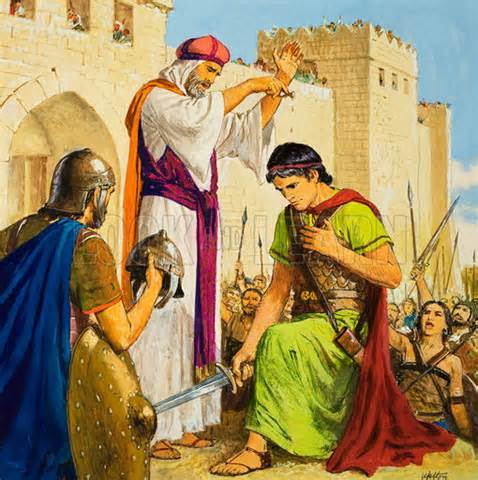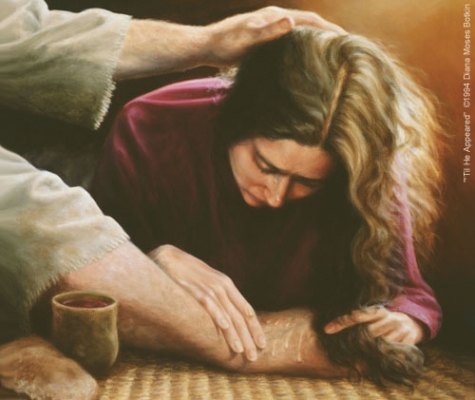
On November 15th at Wesley Methodist Church, Kuala Lumpur, Dr. Philip Yancey shared two stories from the Bible that, on the surface, seem to have nothing in common. “You may be asking yourself why those two stories? How do they fit together? And that is what I want to explain today,” he said.
The first story comes from the Old Testament. It’s a story of King David. King David is perhaps the most famous man of the Old Testament, as there is more written about him than any other character. “He had quite a life!” Dr. Yancey said. Nobody expected him to be the chosen king to replace King Saul, but he was.
However, even though he had been anointed by God to be king, things did not come easy for him. King Saul didn’t like this idea of someone replacing him and so they had a guerilla war, and David was chased around a lot. Many of David’s psalms were written because he thought, “Wait a minute, God told me I’m going to be king and instead, I’m almost killed every day.”
David ended up marrying King Saul’s daughter, Michal, and he eventually did become king. And he was a great king. He expanded the borders of Israel as large as they had ever been. He is known as the all-time great king of Israel. But he made a few mistakes along the way. He not only committed adultery. He also committed murder. That being said, one of the great things about King David was the way he handled his mistakes.

When the prophet Nathan confronted him about his affair with Bathsheba, he didn’t deny it. Instead, he said, “I have sinned against the Lord,” and wrote Psalm 51. Many of us are familiar with verse 10, which says, “Create in me a pure heart, O God, and renew a steadfast spirit within me.” This psalm became kind of an anthem that the whole nation of Israel would sing.
And so we get to the first story of the morning:
“13 And three of the thirty chief men went down and came about harvest time to David at the cave of Adullam, when a band of Philistines was encamped in the Valley of Rephaim. 14 David was then in the stronghold, and the garrison of the Philistines was then at Bethlehem. 15 And David said longingly, “Oh, that someone would give me water to drink from the well of Bethlehem that is by the gate!” 16 Then the three mighty men broke through the camp of the Philistines and drew water out of the well of Bethlehem that was by the gate and carried and brought it to David. But he would not drink of it. He poured it out to the Lord 17 and said, “Far be it from me, O Lord, that I should do this. Shall I drink the blood of the men who went at the risk of their lives?” Therefore he would not drink it. These things the three mighty men did.”
(2 Samuel 23:13-17)
“I remember how when I was a child, I would read this story and it would confuse me,” Dr. Yancey said. “One day David was off in a cave from being chased, and he just kind of gets homesick. And he says, ‘If only I had a cup of water from my hometown, Bethlehem.’
“So these three men risked their lives, went behind enemy lines, and got a cup of water from a well in Bethlehem. They came back and presented it to David. But he didn’t say, ‘Oh this is so good! Oh I love this water!’ Instead, he poured it out on the ground! He said, ‘I could not possibly drink this water. It would be like drinking your blood. This water is sacred. There is only thing worthy of this water.’ So he poured it out as an offering to God, and the men understood his actions. That was part of David’s secret. He was always living for God.”

Dr. Yancey went on to say that there are 150 psalms, 70 of which are credited to David. Of them, about 14 psalms tell us what was going on in David’s life when he wrote them. So one day, Dr. Yancey did an experiment. He went to those 14 psalms that explain what happened, and sure enough. Whenever David reflected on his circumstances, he didn’t reflect so much on his image or the shameful thing he had done. He focused on how he had failed God— “Against You only have I sinned” (Psalm 51:4)
Upon further research, Dr. Yancey found that time and time again, David would write a psalm of praise to God after narrowly escaping death or getting out of a difficult situation. Even though he managed to get himself out of the situation, his psalms only highlighted how God had delivered him.
In our day-to-day life, we all have our own private movie of what goes on, and just by nature, the star of our movie is ourselves. That’s just the way it is. But it was different for David. Whether things were going well or he was on the verge of dying, God was the star of David’s life.

It’s one thing to turn to God when things aren’t going well. It’s another thing to turn to God when things are going well. When things are going badly, we turn to God. We go to church. We pray. That’s really not the problem. The problem is when things are going well, and we become the stars, and we take credit. The unique thing about David is that he turned to God even when things were going well.
It is very easy to forget God. David’s spiritual secret was that when everybody else was giving David credit, David was giving God credit. “That’s the lesson I learned from this story,” Dr. Yancey said.
The second story is from Luke 7:
36 One of the Pharisees asked him to eat with him, and he went into the Pharisee’s house and reclined at the table. 37 And behold, a woman of the city, who was a sinner, when she learned that he was reclining at table in the Pharisee’s house, brought an alabaster flask of ointment, 38 and standing behind him at his feet, weeping, she began to wet his feet with her tears and wiped them with the hair of her head and kissed his feet and anointed them with the ointment. 39 Now when the Pharisee who had invited him saw this, he said to himself, “If this man were a prophet, he would have known who and what sort of woman this is who is touching him, for she is a sinner.” 40 And Jesus answering said to him, “Simon, I have something to say to you.” And he answered, “Say it, Teacher.”
41 “A certain moneylender had two debtors. One owed five hundred denarii, and the other fifty. 42 When they could not pay, he cancelled the debt of both. Now which of them will love him more?” 43 Simon answered, “The one, I suppose, for whom he cancelled the larger debt.” And he said to him, “You have judged rightly.” 44 Then turning toward the woman he said to Simon, “Do you see this woman? I entered your house; you gave me no water for my feet, but she has wet my feet with her tears and wiped them with her hair.45 You gave me no kiss, but from the time I came in she has not ceased to kiss my feet.46 You did not anoint my head with oil, but she has anointed my feet with ointment.47 Therefore I tell you, her sins, which are many, are forgiven—for she loved much. But he who is forgiven little, loves little.” 48 And he said to her, “Your sins are forgiven.” 49 Then those who were at table with him began to say among themselves, “Who is this, who even forgives sins?” 50 And he said to the woman, “Your faith has saved you; go in peace.”
(Luke 7:36-50)
It’s hard for us to grasp the shock of this situation. We read this story about a prostitute barging in on Jesus’ dinner, but we lose the force of it. In order for us to fully comprehend this scenario, we must understand that Jesus was a dinner guest with some very important people, while this woman was the town prostitute. Everybody knew who she was.
“What puzzled me about this story as a child is that the woman would waste so much perfume by pouring it out into the ground,” Dr. Yancey said. That alabaster jar of perfume contained a year’s wages.

Dr. Yancey then went on to explain the significance behind the woman’s actions. “Her job was selling her body. In those days, she didn’t have a lot of things available to her to make her more attractive. This was a desert—a hot place. Smelling good was a great asset, and her job was to get people interested in her body. The best thing she had going for her was that jar of perfume.
“And so she wasn’t just anointing Jesus. She was giving away her career. She was pouring out the most precious thing she had on Jesus’ feet. She was trusting Jesus with her future,” Dr. Yancey pointed out.
If we look through the gospels at all the people Jesus encountered, it is interesting to see how the most responsible and good citizens—the ‘godly people’ were the ones who were threatened by Jesus, while the ‘bad citizens’ and the outcasts were the ones who were drawn to Jesus.
Dr. Yancey drew a parallel between Jesus and the church. If we become the kind of place where sinners don’t want to come when they are in need, then we’re doing something wrong. Jesus was perfect, and it was the person who knew her need for Him who came and poured out her life before Him.
Jesus concludes, “She who has been forgiven much, loves much.” Grace is a free gift from God. You can’t do anything to earn it or to deserve it. To receive it, you need to have your hands open.

Jesus saw two groups of people: Those who were in need of grace but denied it, and those who were in need of grace and knew it. People like the woman at the well, this woman, the thief hanging on the cross… desperate people who had nowhere else to turn. And God loves desperate people. He’s the giver of gifts. He wants to find people with hands open to receive those gifts.
In closing, Dr. Yancey pointed out that these two stories actually have the same plot. Both of them poured out the most precious thing they had as an offering to God. One was about a famous man. Whether or not things were going well for him, it didn’t make any difference. David always made God the star of his movie. And so for those of us where things are going well, watch out because it’s easy to forget God.
And then there’s this woman—we don’t even know her name. But in one of the gospels, Jesus said that as long as history lives, we will be retelling the story of this woman, because she who has been forgiven much, loves much. This woman trusted God with her life and her future, and so should we.
|Share The Good News|
Esperanza Ng




Leave a Reply